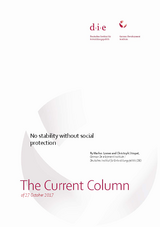The Current Column
No stability without social protection
Loewe, Markus / Strupat, ChristophThe Current Column (2017)
Bonn: German Development Institute / Deutsches Institut für Entwicklungspolitik (DIE), The Current Column of 23 October 2017
The current coalition negotiations should make social protection a key issue of German development cooperation. Even if global economic growth accelerates, it will still take a very long time to eradicate poverty in Africa in particular. Consequently, social protection floors have to be set up to stabilise societies and nations. After all, if additional states fail, then new wars could break out and we could see a further increase in migration to Europe. The World Bank forecasts that the Sustainable Development Goal 1 (eradicating extreme poverty) will not be achieved by 2030 unless there is a substantial increase in economic growth and a considerably higher redistribution of income to the world’s poorest. This is even more the case for sub-Saharan Africa, where economic growth is volatile and a very large proportion of people are living in extreme poverty. Redistribution can be achieved by expanding state education and health systems, but most especially by putting in place social protection floors that provide cash transfers to poor households. These payments can benefit different target groups, depending on need: particularly disadvantaged people, the elderly, incapacitated individuals or residents of specific regions. And they can be tied to specific conditions, such as school attendance for children (cash for education) or work contributed by adults to local infrastructure development (cash for work). For a long time, many politicians have been arguing that developing countries need to grow their economies before they can afford to deliver social policy. However, international comparisons show that even poor countries can finance basic social protection floors. It is certainly not the case on average that they allocate a significantly lower proportion of their gross domestic product (GDP) to such systems than wealthy nations. And in any case, a great deal can be achieved with relatively small sums of money. For example, Lesotho spends 6% of its GDP on social transfers, despite having an annual per capita income of just about USD 1,200. The country set up a social pension system and that against the advice of international donors. The system is now considered extremely successful, yet it costs just 1.8% of GDP. Similarly, Malawi and Peru both have social assistance schemes costing a mere 0.1 to 0.2% of GDP. Ethiopia’s cash for work programme also accounts for just 0.65% of GDP, but supports seven million households.. It is important to note that social protection has important effects not only on social but also on economic and political change. The 2008 to 2009 global economic and financial crisis showed that countries with effective social protection floors perform substantially better at absorbing economic shocks, as social protection systems tend to prevent domestic demand to decrease at the same pace. In addition, the existence of social protection floors helps low-income households in particular to invest and thereby free themselves from poverty. People are reluctant to take risk if they have no social protection at all. They stockpile any savings they do make, rather than investing them, since they need their savings first of all to absorb shocks that are due to risks such as illness and unemployment. Only once people are guaranteed a minimum level of social protection against their most severe risks will they be ready to invest in means of production and training – just because such investment brings about new risks: If things go well, the investors will significantly increase their income, but, in the worst-case scenario, they can even end up making losses. This is why English economist Arthur Pigou identified social protection as the “forgotten production factor” in 1922. It is not something that follows economic growth, but rather the thing that enables economic growth – and, in particular, pro-poor economic growth, which originates with the poor themselves and benefits them most of all. Finally, social protection floors are a good investment for another reason as well – namely because they stabilise state and society, thereby also creating the necessary general conditions for investors. Social protection systems have very positive effects on the social inclusion for disadvantaged individuals by enabling them to participate in education, health care and social and economic life. This increases satisfaction among citizens, along with their acceptance of the existing social and political order, and reduces the risk of uprising and war. German development cooperation should therefore support middle-income countries in the creation and extension of protection floors by providing advisory services and limited financial incentives. Most of these countries can finance their social protection schemes themselves. Low-income countries, however, depend on the international donor community financing even current transfer payments. As a minimum contribution, these countries could at least top up these transfers whenever external economic shocks and natural disasters occur or are likely to occur. Europe has a major interest itself in the extension of social protection systems in developing countries. Their long- term, sustainable stability matters, as it reduces the risk of additional civil wars, state failure and further increases in migration movements towards Europe.



